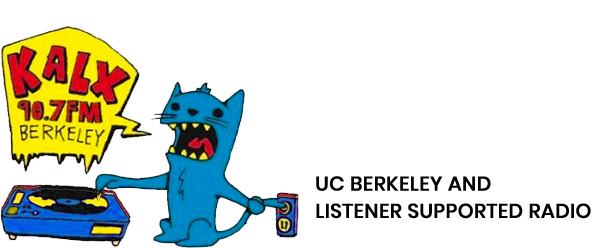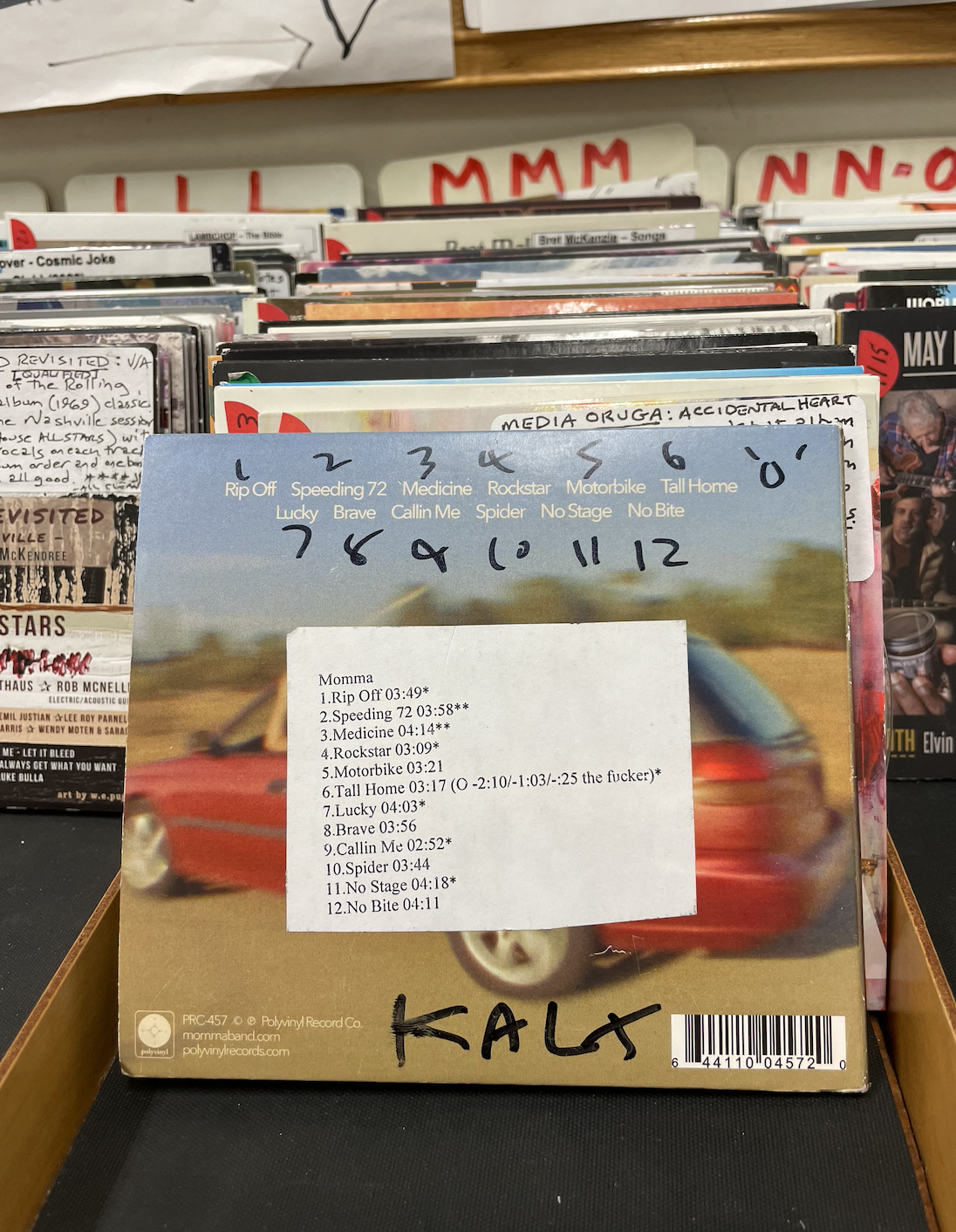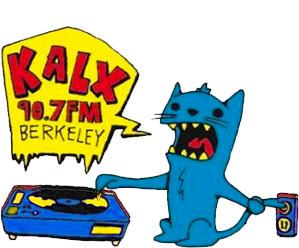Each week, KALX gets dozens of new releases to be added to the Features bin in our legendary library. Household Name, the 3rd studio album by Momma, recently became part of this features bin, and has quickly become one of my favorite albums of 2022. For an in-depth review of a sick album, read on!
Sometimes a revival can be reductive. Take Greta Van Fleet’s divisive mimicry of Led Zeppelin or more recently, abysmal reviews of Tik Tok sensation Måneskin — all examples of nostalgia gone wrong. Fortunately, the LA based group Momma carefully walks the line of recollection and renewal in their latest release Household Name.
The album doesn’t really start until “Speeding 72.” A door slams and the ignition growls: no push button start, just a good old fashioned key. The analog beep of the car explodes into the first of many addictive riffs. The guitar sound pays both homage to the grunge and lofi rock that came before it — Nirvana and Pavement are often cited as inspirations — but more than that, their sound, shifting between buzzing and crystal clear, grounds the song, and the whole record, in an intimate space. Listening to the record, summons them into the room with you, or even better, transports you to a sweaty houseshow. Momma managed to recreate the rawness that they admire in so many other grunge-outfits. 90s lo-fi production has always lent itself to a youthful, urgent tone, and Household Name is a shining example of what it can add to a record.
The band’s vocals, however, reach for a newer sound. Allegra Weingarten and Etta Friedman, the vocal and axe-wielding duo at the heart of Momma, started playing together while still in highschool, which explains their sweet, enjoyable dynamic if you’re lucky enough to see them onstage. Now, at 24 and 23 respectively, their closeness is mimicked in the duality of their voices. Where Allegra goes high, Etta goes low, creating tight, mesmerizing vocals — the types of harmonies that get stuck in your head. While vocal harmonies have had a recent revival in the indie scene (think boygenius, or perhaps for a better comparison, Girlpool), what sets Momma apart is how their vocals mimic the duo’s chemistry on guitar. Just like the guitar riffs and rhythm, which were written in joint effort (each pair took turns writing one part or the other), each vocal compliments each other, not just in harmony, but in tone itself. In the addictive chorus of “Medicine,” Weingarten’s reedy alto floats above Friedman’s, bringing joy into the proposition of substance abuse, as she harmonizes on the phrase “one shooooot.” Then, Freidman’s raspy, tough voice takes over as she laments “I never really ask a lot.” It’s hard to get the duality of dependence across in less than 4 bars, but Momma does it in a way that will stay in your head for weeks.
Household Name reads in many ways as an album about reliance. On their two previous releases, 2018’s Interloper and 2020’s Two of Me, the duo seemed more interested in telling stories of bored adolescence, which is invariably tied to a dream of escape. On “Sidewalk,” the first track off Interloper, the two sing in protest “But I’m not / stuck on the sidewalk,” with lines coyly that illustrate just how stuck they are, while giving a nod to their favorite 90s sounds. While Household Name keeps the Pavement references going (in “Speeding 72”: “You can catch us around / Listening to “Gold Soundz”) their dreams of teenage escape take a different shape. On “Motorbike,” where a hottie on a motorcycle seems to be the savior that Weingarten needs, she sings “Don’t go back to Texas babe / unless you want your heart to break.” Here, love is not only an escape, but a threat, almost a trap.
There is no relationship more codependent than fame, and Momma pokes fun of the concept on the track “Rockstar,” where the running joke seems to be the small time privileges that being a rockstar grants, if such a thing exists in 2023.The duo offers “I know this club called Tuesday’s / I could get us backstage.” But the dependency is there too, something that the dual nature of their voices, the push and pull of negotiating relationships, represents beautifully. Friedman almost growls, in the quiet pre-chorus of the song, “Yeah, I got what they want / I’m a real rockstar.” She doesn’t seem to be touting the joys of fame; it doesn’t even sound like she’s living out her own desire, but instead, is living their collective dream. The exploitative nature of fame here is depicted not unlike love or alcohol — to Momma, they’re all addictive.
There’s always a danger in trying to categorize music. It would be unfair to call Momma a 90s throwback (when did the 90s feature harmonies so captivating?), but just as equally unfair to put them in the overtired “sad girl indie” category that basically any woman who plays the guitar is condemned to nowadays. When Snail Mail’s Lindsay Jordan, a Momma fan who is also dating Friedmen (ok, it might not be confirmed, but c’mon, these insta posts are pretty damning!), had an interview with KALX, she complained about being pigeonholed into one genre because of her gender. This kind of categorization minimizes not only musicians, but also the evolution of music as something dynamic and diverse– genres are made to be bent, and sounds exist to be shared. While Momma’s third album draws on plenty of references, it sticks out because it is a synthesis; even as they brag in the first track, “Now you’re singing along / to my song / a rip off,” they’ve created a fresh sound. The album’s earnest moments (the sentimental “Lucky,” the resentful “No Bite”) work because they contrast with the more tongue-in-cheek moments, and Weingarten’s sweet vocals only catch my ears because of how Friedman’s cut them down. Household Name is a lot more than a couple sweet riffs and 90s production.
In the final song, Friedman’s husky voice finally distills down the fear at the center of the album: “Am I a vessel with no bill / A pleasure center siphoning your fill?” In an industry built to put artists in boxes and then sell those boxes for profit, bands — especially referential ones — are treated like nostalgia machines, and musicians’ relationships to this industry are dependent by design. Is there any escape from the reductiveness of packaging art into neat little categories to be enjoyed on shuffle? At least Momma has some bite: in “No Stage,” Weingarten promises to fill an auditorium, to give us whatever we want from her, but she also reminds us “I’d be playing alone / if I had the chance.” Momma doesn’t need an audience to make good music — but it wouldn’t hurt if they became a household name. I’ll listen either way.


